About the Artists
Throughout the book, we spotlight a diverse group of musician-scholars who integrate research into their creative and professional endeavors. These experts share insights into how they navigate the intricacies of copyright and publishing within their work. Featuring detailed profiles of each artist, this section offers a closer look at their journeys and contributions to the field.
Christina Farrell
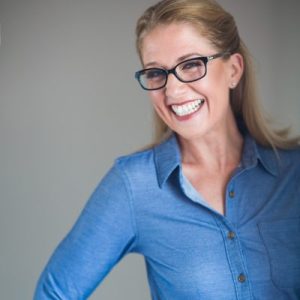 Christina Farrell specializes in arts integration and has over twenty years of experience as a teaching artist, consultant, and professional development facilitator. The founding director of Throughline Arts, she is a Master Teaching Artist with the Wolf Trap Institute for Early Learning Through the Arts, and has provided early childhood residencies, educator mentoring and teaching artist training across the U.S., Singapore, India, and South Korea. She has facilitated professional development workshops for educators in partnership with Kennedy Center Education, Pittsburgh Cultural Trust, and Turnaround Arts. In 2005, Christina founded Opera Ignite, whose premier early childhood residency program “An Opera is a Story” has served 1800+ children since 2010 in partnership with Toledo Opera and Pittsburgh Festival Opera. She is a member of the Teaching Artists Guild National Advisory Council and is an alumnus of Lincoln Center Education’s Leadership Lab under the direction of Eric Booth.
Christina Farrell specializes in arts integration and has over twenty years of experience as a teaching artist, consultant, and professional development facilitator. The founding director of Throughline Arts, she is a Master Teaching Artist with the Wolf Trap Institute for Early Learning Through the Arts, and has provided early childhood residencies, educator mentoring and teaching artist training across the U.S., Singapore, India, and South Korea. She has facilitated professional development workshops for educators in partnership with Kennedy Center Education, Pittsburgh Cultural Trust, and Turnaround Arts. In 2005, Christina founded Opera Ignite, whose premier early childhood residency program “An Opera is a Story” has served 1800+ children since 2010 in partnership with Toledo Opera and Pittsburgh Festival Opera. She is a member of the Teaching Artists Guild National Advisory Council and is an alumnus of Lincoln Center Education’s Leadership Lab under the direction of Eric Booth.
Christina has performed with Washington National Opera, Baltimore’s Opera Vivente, Opera Theater of Pittsburgh, Westmoreland Symphony Orchestra, Revival Theatre Company, and at the Kennedy Center for the Performing Arts as a Finalist with the National Symphony Orchestra’s Young Soloists’ Competition. She is a 2011 recipient of the Fred Rogers Memorial Scholarship presented by the Television Academy of Arts and Sciences. Christina holds a bachelors degree in Vocal Performance from Carnegie Mellon University and a masters in Educational Theatre from New York University.[1]
Jonathan Heyward
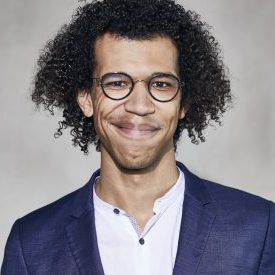 Jonathon Heyward is forging a career as one of the most exciting conductors on the international scene. He currently serves as Music Director of the Baltimore Symphony Orchestra, having made his debut with the BSO in March 2022 in three performances that included their first-ever performance of Shostakovich’s Symphony No. 15. In summer 2024, Jonathon will become Renée and Robert Belfer Music Director of the Festival Orchestra of Lincoln Center. This appointment follows a highly acclaimed Lincoln Center debut with the Mostly Mozart Festival Orchestra in summer 2022, as part of their Summer for the City festival. Jonathon is committed to education and community outreach work, as well as including new music within his imaginative concert programs.
Jonathon Heyward is forging a career as one of the most exciting conductors on the international scene. He currently serves as Music Director of the Baltimore Symphony Orchestra, having made his debut with the BSO in March 2022 in three performances that included their first-ever performance of Shostakovich’s Symphony No. 15. In summer 2024, Jonathon will become Renée and Robert Belfer Music Director of the Festival Orchestra of Lincoln Center. This appointment follows a highly acclaimed Lincoln Center debut with the Mostly Mozart Festival Orchestra in summer 2022, as part of their Summer for the City festival. Jonathon is committed to education and community outreach work, as well as including new music within his imaginative concert programs.
Jonathon’s recent and future guest conducting highlights in the United Kingdom include debuts and re-invitations with the London Symphony Orchestra, BBC National Orchestra of Wales, BBC Symphony, Royal Scottish National Orchestra, The Hallé in Manchester, National Symphony Orchestra Ireland, City of Birmingham Symphony Orchestra, Royal Academy of Music, and Scottish Chamber Orchestra. In continental Europe, amongst Jonathon’s recent and forthcoming debuts are collaborations with the Castilla y León Symphony, Galicia Symphony, Danish National Symphony, Orchestre de Chambre de Lausanne, Brussels Philharmonic, Orchestre National Bordeaux Aquitaine, Tonhalle Düsseldorf, Hamburg Symphony, MDR-Leipzig Symphony, NDR Elbphilharmonie Orchester.
In high demand in the USA, and in addition to his Music Director positions, Jonathon conducts prominent orchestras such as the New York Philharmonic; the Atlanta, Detroit, Houston, Seattle, Dallas, and St Louis symphonies; and the Minnesota Orchestra.
Born in Charleston, South Carolina, Jonathon began his musical training as a cellist at the age of ten and started conducting while still at school. He studied conducting at the Boston Conservatory of Music, where he became assistant conductor of the prestigious institution’s opera department and of the Boston Opera Collaborative, and he received postgraduate lessons from Sian Edwards at London’s Royal Academy of Music. Before leaving the Academy, he was appointed assistant conductor of the Hallé Orchestra, where he was mentored by Sir Mark Elder, and became Music Director of the Hallé Youth Orchestra. In 2023, he was named a Fellow of the Royal Academy of Music; an honor reserved for Academy alumni. [2]
Lauron Kehrer
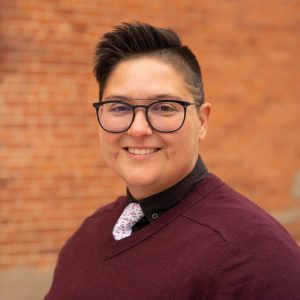 Lauron Kehrer is a musicologist and ethnomusicologist studying the intersections of race, gender, and sexuality in American popular music. They are an Assistant Professor of Ethnomusicology and Musicology in the Irving S. Gilmore School of Music at Western Michigan University where they teach courses in popular music, global music cultures, and western art music. Lauron has published articles on queer identity and women’s music, white rapper Macklemore’s LGBTQ activism, and queer resonances in the work of Beyoncé in the journals American Music, the Journal of the Society for American Music, and Popular Music and Society, respectively. The latter received honorable mention for the 2020 Marcia Herndon Prize for exceptional ethnomusicological work in gender and sexuality from the Society for Ethnomusicology. Their book, Queer Voices in Hip Hop: Cultures, Communities, and Contemporary Performance (University of Michigan Press, Tracking Pop series, Fall 2022) examines the work of queer and trans artists in hip hop. Lauron served in various roles within the American Musicological Society, the Society for Ethnomusicology, the Society for American Music, and the International Association for the Study of Popular Music – U.S. Branch.
Lauron Kehrer is a musicologist and ethnomusicologist studying the intersections of race, gender, and sexuality in American popular music. They are an Assistant Professor of Ethnomusicology and Musicology in the Irving S. Gilmore School of Music at Western Michigan University where they teach courses in popular music, global music cultures, and western art music. Lauron has published articles on queer identity and women’s music, white rapper Macklemore’s LGBTQ activism, and queer resonances in the work of Beyoncé in the journals American Music, the Journal of the Society for American Music, and Popular Music and Society, respectively. The latter received honorable mention for the 2020 Marcia Herndon Prize for exceptional ethnomusicological work in gender and sexuality from the Society for Ethnomusicology. Their book, Queer Voices in Hip Hop: Cultures, Communities, and Contemporary Performance (University of Michigan Press, Tracking Pop series, Fall 2022) examines the work of queer and trans artists in hip hop. Lauron served in various roles within the American Musicological Society, the Society for Ethnomusicology, the Society for American Music, and the International Association for the Study of Popular Music – U.S. Branch.
Originally from Ann Arbor, Michigan, Lauron received a Ph.D. in Musicology from the Eastman School of Music, University of Rochester, where their dissertation received the Alfred Mann Dissertation Award from the Eastman School of Music, and the Susan B. Anthony Dissertation Award from the Susan B. Anthony Institute for Gender, Sexuality, and Women’s Studies. Lauron also completed a MA in Ethnomusicology at Eastman, a Graduate Certificate in Women and Gender Studies from the Susan B. Anthony Institute, a bachelor’s degree (BM) in Flute Performance, as well as an undergraduate specialization in Women, Gender, and Social Justice from Michigan State University.[3]
Kyoko Kitamura
 Kyoko Kitamura is a vocal improviser, bandleader, composer, and educator based in Brooklyn, New York. She currently co-leads Geometry (with Taylor Ho Bynum, Joe Morris, Tomeka Reid), performs in Siren Xypher, a trio with violist Melanie Dyer and pianist Mara Rosenbloom, and appears on albums by William Parker, Cory Smythe, and Russ Lossing. For over a decade, Kitamura worked with legendary musician and composer Anthony Braxton. She is featured on many of his releases including GTM (Syntax) 2017, the 12-hour recording of his vocal works performed by the Tri-Centric Vocal Ensemble which she directed and co-produced, as well as his operas Trillium E and Trillium J. Kitamura is the creator of Introduction to Syntactical Ghost Trance Music, the 2023 mini-documentary film on Anthony Braxton and his Syntactical Ghost Trance Music system.
Kyoko Kitamura is a vocal improviser, bandleader, composer, and educator based in Brooklyn, New York. She currently co-leads Geometry (with Taylor Ho Bynum, Joe Morris, Tomeka Reid), performs in Siren Xypher, a trio with violist Melanie Dyer and pianist Mara Rosenbloom, and appears on albums by William Parker, Cory Smythe, and Russ Lossing. For over a decade, Kitamura worked with legendary musician and composer Anthony Braxton. She is featured on many of his releases including GTM (Syntax) 2017, the 12-hour recording of his vocal works performed by the Tri-Centric Vocal Ensemble which she directed and co-produced, as well as his operas Trillium E and Trillium J. Kitamura is the creator of Introduction to Syntactical Ghost Trance Music, the 2023 mini-documentary film on Anthony Braxton and his Syntactical Ghost Trance Music system.
Separate from her work in music, Kitamura has had a career as a media professional as foreign news correspondent in Japan covering Iraq, Kuwait and Saudi Arabia. As an educator, she teaches composition for improvisers, the business side of music and the application of musical creativity to other real-life situations. She has taught at many institutions including Dartmouth College, Face the Music (Kaufman Music Center), Arts for Art’s Visionary Youth Orchestra and The New School, and as a visiting faculty at Bennington College. Kitamura has performed in major festivals, including Big Ears (Knoxville, TN), JazzFest Berlin (Germany), Moers Festival (Germany), Edition Festival for Other Music (Stockholm, Sweden) and Vision Festival (NYC). A pianist, Kitamura was born in New York City (U.S.A.), raised partially in Tokyo (Japan), spent a few summers in Melbourne (Australia), lived and worked for many years in Paris (France), currently resides in Brooklyn, NY (U.S.A.).[4]
Suzanne Kite
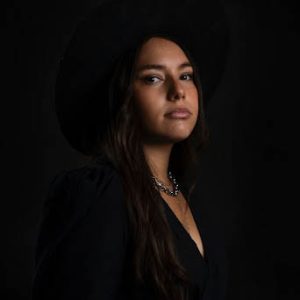 Suzanne Kite is an award-winning Oglála Lakȟóta artist, composer, and academic. Her scholarship and practice explore contemporary Lakȟóta ontology (the study of beinghood in Lakȟóta), artificial intelligence, and contemporary art and performance. She creates interfaces and arranges software systems that engage the whole body, in order to imagine new ethical AI protocols that interrogate past, present, and future Lakȟóta philosophies. Her interdisciplinary practice spans sound, video, performances, instrument building, wearable artwork, poetry, books, interactive installations, and more. Her work has been included in publications such as Atlas of Anomalous AI, Journal of Design and Science (MIT Press), and The Funambulist. Her award-winning article “Making Kin with Machines” and the sculpture Ínyan Iyé (Telling Rock) were featured on the cover of Canadian Art. Dr. Kite has been working with machine learning techniques since 2017 and developing body interfaces for performance since 2013.
Suzanne Kite is an award-winning Oglála Lakȟóta artist, composer, and academic. Her scholarship and practice explore contemporary Lakȟóta ontology (the study of beinghood in Lakȟóta), artificial intelligence, and contemporary art and performance. She creates interfaces and arranges software systems that engage the whole body, in order to imagine new ethical AI protocols that interrogate past, present, and future Lakȟóta philosophies. Her interdisciplinary practice spans sound, video, performances, instrument building, wearable artwork, poetry, books, interactive installations, and more. Her work has been included in publications such as Atlas of Anomalous AI, Journal of Design and Science (MIT Press), and The Funambulist. Her award-winning article “Making Kin with Machines” and the sculpture Ínyan Iyé (Telling Rock) were featured on the cover of Canadian Art. Dr. Kite has been working with machine learning techniques since 2017 and developing body interfaces for performance since 2013.
Her artwork and performance have been featured at numerous venues, including the Hammer Museum, Whitney Museum of American Art, PS122, Anthology Film Archives, Chronus Art Center, and Toronto Biennial of Art. Honors include the Pierre Elliott Trudeau Foundation Scholarship; Tulsa Artist Fellowship; Sundance New Frontiers Story Lab Fellowship, which allowed her to collaborate with top experimental artists and develop a film with AI techniques, Fever Dream (2021); Women at Sundance |Adobe Fellowship; and Common Field Fellowship, among others. In fall 2022, she gave a talk at Bard as part of the Disturbance, Re-Animation, and Emergent Archives conference, hosted by the Rethinking Place: Bard-on-Mahicantuck, a three-year project that proposes a Native American and Indigenous Studies approach to revitalize the undergraduate American Studies Program.
Dr. Kite hold a BFA from the California Institute of the Arts, an MFA from Milton Avery Graduate School at Bard College, and a PhD from Concordia University.[5]
Paula Maust
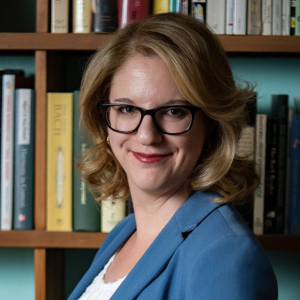 Paula Maust is a performer, scholar, and educator dedicated to fusing research and creative practice to amplify underrepresented voices and advocate for social change. She is the creator of Expanding the Music Theory Canon, an open-source collection of music theory examples by women and people of color. A print anthology based on the project is under contract with SUNY Press, and she is working on a large-scale recording project to create professional recordings of all works on the site that have not yet been commercially recorded. Paula is also one of the early modern area editors for Oxford University Press’s women, gender, and sexuality revision of Grove Music Online.
Paula Maust is a performer, scholar, and educator dedicated to fusing research and creative practice to amplify underrepresented voices and advocate for social change. She is the creator of Expanding the Music Theory Canon, an open-source collection of music theory examples by women and people of color. A print anthology based on the project is under contract with SUNY Press, and she is working on a large-scale recording project to create professional recordings of all works on the site that have not yet been commercially recorded. Paula is also one of the early modern area editors for Oxford University Press’s women, gender, and sexuality revision of Grove Music Online.
Paula has published articles in Women and Music and the Journal of the International Alliance for Women in Music, and she has presented her research at conferences of the American Musicological Society, the Society for Seventeenth-Century Music, the American Handel Society, the Indiana University Historical Performance Institute, and the Music Theory Society of the Mid-Atlantic. As a harpsichordist and organist, Paula has been praised for combining “great power with masterful subtlety” (DC Metro Theater Arts) and as a “refined and elegant performer” (Boston Musical Intelligencer). As the co-director of Musica Spira, she curates provocative lecture-concerts connecting baroque music to contemporary social issues focused on women. Paula performs extensively as a continuo player with numerous ensembles in the Baltimore-Washington, D.C. region, including the Washington Bach Consort, the Folger Consort, and Third Practice. Currently, she serves a music theory faculty at the Peabody Institute of the Johns Hopkins University. She holds doctorate and master’s degrees in harpsichord from Peabody, a master’s in organ from the Cleveland Institute of Music, and a bachelors from Valparaiso University.[6]
Robin McGinness
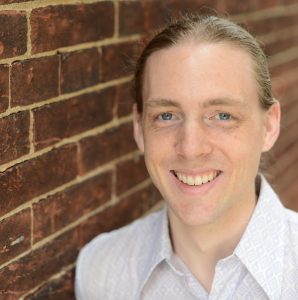 Robin McGinness is an operatic baritone and career coach interested in finding ways to use theater and games to facilitate professional development, self-management for performers, art song house concerts, and modernizing the operatic repertoire. Currently an instructor of Professional Studies at the Peabody Institute, Robin helped create core classes of the Breakthrough Curriculum, Building a Brand and Portfolio, and Pitching Your Creative Idea. Robin also co-authored Peabody’s first open educational resource title, The Path to Funding: The Artist’s Guide to Building Your Audience, Generating Income, and Realizing Career Sustainability. A staff member of LAUNCHPad, Peabody’s career services office, since 2015, Robin has invested years in helping both undergraduate and graduate students prepare for their lives after school. Robin also co-hosts MaxQ, Peabody LAUNCHPad’s podcast focused on exploring what life is like for recent Peabody graduates.
Robin McGinness is an operatic baritone and career coach interested in finding ways to use theater and games to facilitate professional development, self-management for performers, art song house concerts, and modernizing the operatic repertoire. Currently an instructor of Professional Studies at the Peabody Institute, Robin helped create core classes of the Breakthrough Curriculum, Building a Brand and Portfolio, and Pitching Your Creative Idea. Robin also co-authored Peabody’s first open educational resource title, The Path to Funding: The Artist’s Guide to Building Your Audience, Generating Income, and Realizing Career Sustainability. A staff member of LAUNCHPad, Peabody’s career services office, since 2015, Robin has invested years in helping both undergraduate and graduate students prepare for their lives after school. Robin also co-hosts MaxQ, Peabody LAUNCHPad’s podcast focused on exploring what life is like for recent Peabody graduates.
As a baritone soloist, Robin has performed in the Kennedy Center Concert Hall and Carnegie Hall’s Stern Auditorium. Other recent performances include Carmina Burana with Maryland Symphony Orchestra, Duruflé Requiem with the Peabody Symphony Orchestra, and Brahms Requiem with The Washington Chorus, a performance praised by the Washington Post for its “warm baritone.” Robin holds degrees from Oberlin Conservatory and the Peabody Institute. Previously, McGinness has been a resident artist at Opera Theater St. Louis, Pittsburgh Festival Opera, Teatro Nuovo, and Bel Canto at Caramoor and was the Baritone Studio Artist in the Arizona Opera Marion Roose Pullin Opera Studio. An award-winning performer, Robin placed first in the Sylvia Greene Vocal Competition, second in the Piccola Opera Competition, and received the Patricia A. Edwards Award in the Annapolis Opera Vocal Competition.[7]
Media Attributions
- Christina Farrell © Portrait photo is licensed under a All Rights Reserved license
- Jonathon Heyward © Portrait photo by Laura Thiesbrummel is licensed under a All Rights Reserved license
- Lauron J. Kehrer © Portrait photo is licensed under a All Rights Reserved license
- Kyoko Kitamura © Portrait photo is licensed under a All Rights Reserved license
- Suzanne Kite © Portrait photo by Yuula Benivolski is licensed under a All Rights Reserved license
- Paula Maust © Portrait photo is licensed under a All Rights Reserved license
- Robin McGinness © Portrait photo is licensed under a All Rights Reserved license